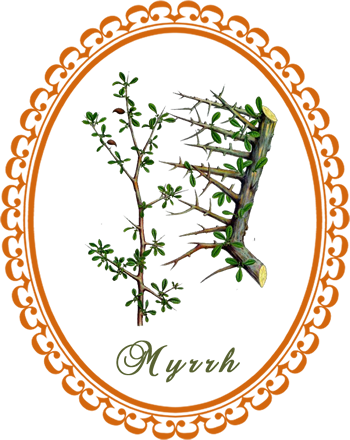
Myrrh: strong anti-microbial action used for the treatment of infections, particularly as mouthwash ...
Common Names: Myrrh
Botanical Name: Commiphora myrrha
Family: Burseraceae
Plant Type: Desert tree
Parts Used: Resin
Myrrh is native to Africa and Asia. The tree grows to a height of about 9 - 15 feet and has yellow-red flowers followed by small fruits.
Cultivation: Myrrh is a small desert tree that grows only in a small area of the Middle East where a certain type of basaltic soil is found. Myrrh prefers shallow soil over limestone, in full sun. Sow seeds in spring in a greenhouse.
Harvesting: Resin exudes from the bark fissures - make cuts in branches to increase resin production, then collect, and dry in the sun.
Myrrh Magick
Protection. Exorcism. Healing. Spirituality.
Gender: Feminine
Planet: Moon
Element: Water
Deities: Isis, Adonis, Ra, Marian
Use myrrh to increase the power of any incense.
Include myrrh and frankincense in healing incenses and sachets.
Burn myrrh with frankincense or other resins to purify the area, lift the vibrations and create peace.
Myrrh was used in ritual in ancient Egypt. Myrrh was burned to Ra at noon, and was also used in the temples of Isis. Moses anointed priests with an ointment that contained myrrh, and the Magi reputedly brought it to Jesus at his birth. According to the Gospel of Mark, myrrh resin mixed with wine was the intoxicant offered to Christ before he was crucified. As well as numbing the pain, the mix was believed to raise a person's spiritual state.
Herbal Healing with Myrrh
Medicinal Actions: Analgesic, antibacterial, antidiabetic, antifungal, anti-inflammatory, antiputrid, antiseptic (strong), (infected gums), antispasmodic, antitussive, aperitive, astringent, balsamic, carminative, cicatrizant, cooling, deodorant, depurative, disinfectant, diuretic, drying, emmenagogue, expectorant, fixative, healing (traumatic injuries), hemostatic, invigorating (immune system), meditation aid, moisturizer, pectoral, rejuvenator (skin cells), revitalizing (skin), sedative, stimulant (digestive system), stomachic, sudorific, tonic (stomach), tonifying (cleanses and tightens the skin), vulnerary
Medicinal Uses: Myrrh is used for infections of the mouth and gums, as well as sinusitis and sore throats. Externally it is useful in the healing of wounds.
Body Care with Myrrh
- To encourage cell renewal in wounds that are slow to heal, apply a little myrrh wound-healing blend to the affected areas twice a day
- To reduce inflamed gums, add 3 drops myrrh gum healer to a glass of water; swish in the mouth for 2 - 3 minutes (then spit out) three times daily.
Wound-Healing Blend: Mix 3 drops myrrh and 3 drops frankincense essential oils in 2 teaspoons sweet almond oil.
Gum Healer: Mix 5 teaspoons myrrh tincture (200g / 7 oz powdered resin) with 1 teaspoon goldenseal tincture, add 3 drops each tea tree and thyme and 10 drops peppermint essential oils; shake well.
Source: The Essential Herbs Handbook by Lesley Bremness
If you appreciate the information provided,
please help keep this website running. Blessings!
© 2008-2025 aromaworx.ca. All rights reserved.

